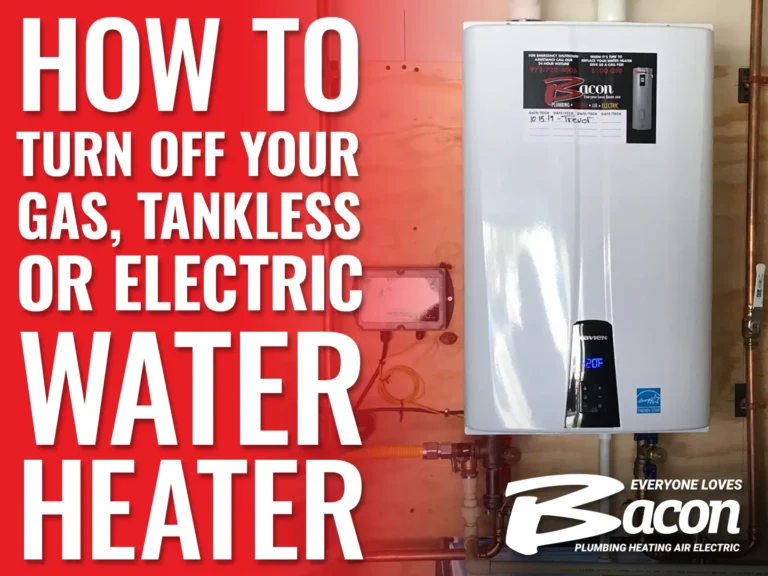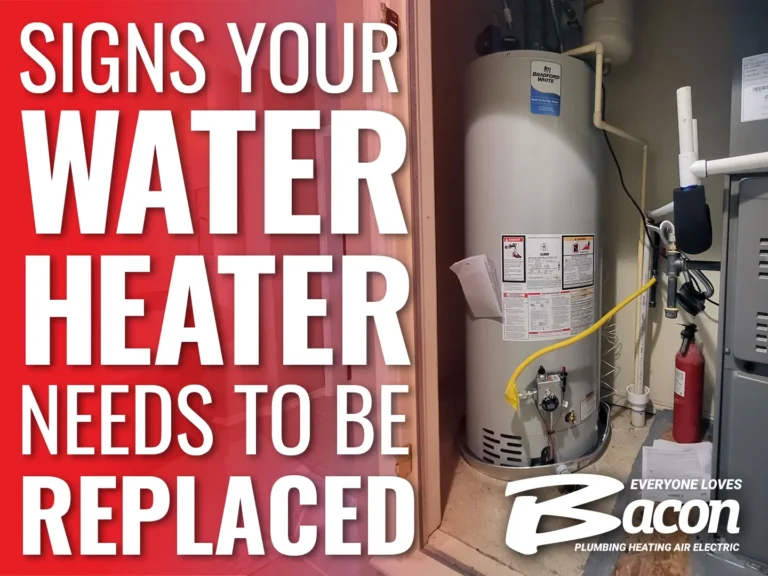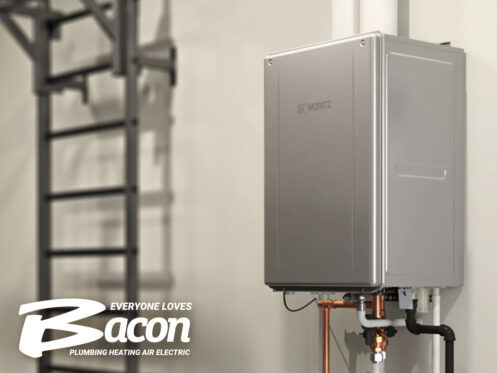Hot water is something many of us take for granted until there’s a problem. We enjoy hot showers, clean dishes, and wash clothes—all with the help of our water heater. So when something does go wrong, it’s natural to have questions about your water heater’s performance and efficiency.
In this blog, the experts at Bacon Plumbing Heating Air Electric discuss frequently asked questions about water heaters. From water heater replacement to smelly water problems, the experts break down everything you need to know, so you can spend extra time with friends and family—not fixing your hot water.
How Long Does It Take to Install a Water Heater?
If there are no complications, a professional can install your water heater in two to three hours. To help speed up the process, you can clear away any boxes or debris cluttering the area where your heater will go. If you currently have a water heater, it must be drained and removed before your new unit is installed. After this, your installer will take the time to place your water tank in just the right spot and connect it to a source.
Depending on your type of water heater, your plumber may connect the tank to a gas line. After installation, a professional will ensure your new heater is up to code and functioning properly. If you have questions about how long your appointment may take, or your water heater replacement cost, don’t hesitate to ask your plumber.
How Long Should It Take for Hot Water to Heat Up?
The time it takes for your water heats up depends on the size of your home, type of heater, pipe diameter, and condition of your heater. Generally, electric water heaters take anywhere from sixty to eighty minutes, while propane storage heaters can be a bit quicker, about thirty to forty minutes. Hot water can be almost instantaneous if you’re using a tankless water heater.
If you want to check how long your specific heater should take, water heaters are measured by their first-hour rating, which describes how many gallons of hot water it can supply, starting with a full tank. You can find this number on the manufacturer’s label on the front of the tank. If your water heater is taking longer than it should or isn’t operating at its first-hour rating, contact a plumber near you for a system evaluation.
Can a Water Heater Explode?
Unfortunately, yes. Anything that strains your water heater, like a gas leak or sediment buildup, can lead to a dangerous explosion. While these explosions are rare, there are a few signs to look out for, including:
Rotten egg smell in the water
Popping or knocking noises
Leaking pressure relief valve (usually at the top of the heater on one side)
If you notice any of these signs, we recommend you contact a professional plumber immediately. A heater explosion can devastate your home’s plumbing system and injury anyone inside. In cases of water heater accidents, you’d rather be safe than sorry.
Does the Outside Temperature Affect Water Heater Efficiency?
Yes! Since the water coming into the water heater will be colder, the system has to work harder. If your pipes aren’t already insulated, it may be beneficial to add protection, so your water doesn’t cool off en route from the heater to you. In the winter, you can turn up the temperature on your heater’s thermostat by five to ten degrees to make up for the difference. However, avoid cranking up the temperature in frustration over a lack of hot water. If you turn it up too fast and too quickly, you may end up with scalding water the next time you shower.
You can turn up the temperature of your heater at home. There’s a panel on the front of the tank for most gas water heaters with the letters A, B, and C. The temperatures increase from A to C, with C being the hottest. If your home has an electric heater, you can unscrew the panel and raise the temperature. Many folks don’t have problems changing the temperature on their heater, but if you run into any bumps along the way, feel free to contact professionals for backup.
Is It Dangerous If My Hot Water Smells Bad?
Unpleasant water happens for a few reasons. First, the naturally occurring ions in water can react with the stainless steel of the water heater tank, creating a chemical reaction that produces hydrogen sulfide . This gas is the culprit of the rotten egg odor you may be experiencing in taste and smell.
If your water heater is inactive for too long, bacteria have plenty of time to multiply and find their way into your sinks, faucets, and water. Or, if you have a water softener, the magnesium anode rod inside the system can react with the soft water and release sulfate gas.
Before taking action, check your sink drain and around your home to ensure the smell comes from the water itself. If you’ve diagnosed your hot water as the prime suspect of a pesky odor, we recommend you flush out your hot water heater and refill it. If the smell still remains, you can add a bit of vinegar or bleach and re-flush the system.
Smelly water can cause vomiting, lightheadedness, headaches, and dizziness at high exposure levels. However, these high levels aren’t typically reached in cases of household water. But if you’re still experiencing foul odors, contact a professional plumber for assistance.
Your Trusted Water Heater Experts
Wash dishes after a holiday party, clean your family’s laundry, and more without a hitch with a functional water heater. With these answers to common problems, you can avoid common water heater conundrums and enjoy the holidays. If you experience a problem with your water heater or need a water heater repair, don’t hesitate to contact the professional plumbers at Bacon Plumbing Heating Air Electric.
Everyone Loves Bacon in the Dallas-Fort Worth Area!
With years of experience, our technicians can tackle any water heater problem, like replacing a water heater. If you experience problems with your water heater this holiday season, call the experts at Bacon! We offer service 24 hours a day, 7 days a week. Call us at (469) 864-7538 or contact us online today!



